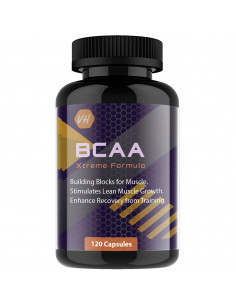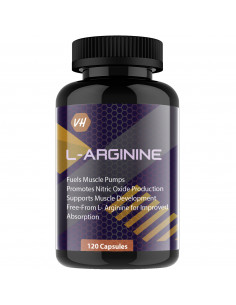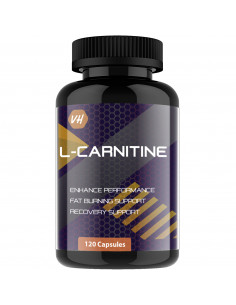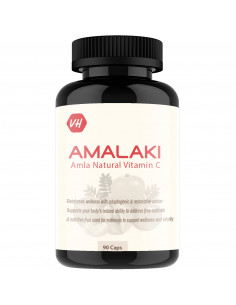- Supplement
- 1 likes
- 1004 views
Nitric oxide (NO) is a gas molecule that has gained popularity in the world of bodybuilding due to its potential benefits for athletes. Nitric oxide is produced naturally in the body and plays a crucial role in several physiological processes, including blood flow, oxygen delivery, and immune function. This article will explore why nitric oxide is required for bodybuilding and how it can benefit athletes, with references to scientific studies.
Increased Blood Flow to the Muscles
One of the main reasons nitric oxide is important for bodybuilding is its ability to increase blood flow to the muscles. During exercise, muscles require more oxygen and nutrients to perform optimally. Nitric oxide acts as a vasodilator, meaning it dilates blood vessels and increases blood flow to the muscles. This increased blood flow helps to deliver more oxygen and nutrients to the muscles, which can improve exercise performance and support muscle growth.
Several studies have investigated the effects of nitric oxide on blood flow in athletes. In a study published in the Journal of Strength and Conditioning Research, researchers found that supplementation with nitric oxide precursors, including arginine and citrulline, increased blood flow to the muscles during resistance exercise in healthy young men (1). Another study published in the International Journal of Sport Nutrition and Exercise Metabolism found that supplementation with nitrate, a precursor to nitric oxide, improved blood flow and exercise performance in trained cyclists (2).
Improved Nutrient Uptake
Nitric oxide can also improve nutrient uptake by enhancing the activity of nutrient transporters. This can help to ensure that the muscles have the building blocks they need to grow and repair after exercise. In a study published in the American Journal of Physiology-Endocrinology and Metabolism, researchers found that nitric oxide enhanced glucose uptake in human skeletal muscle cells (3). Another study published in the Journal of Applied Physiology found that nitric oxide increased the uptake of amino acids, including the essential amino acid leucine, in human muscle cells (4).
Reduced Muscle Fatigue
Nitric oxide may also play a role in reducing muscle fatigue. During exercise, muscles produce lactic acid, which can contribute to fatigue and muscle soreness. Nitric oxide has been shown to help clear lactic acid from the muscles more quickly, allowing athletes to train harder and recover faster. In a study published in the Journal of Applied Physiology, researchers found that nitric oxide increased blood flow and reduced muscle fatigue during high-intensity exercise in healthy young men (5).
Stimulated Muscle Protein Synthesis
In addition to its effects on blood flow and nutrient uptake, nitric oxide can also impact muscle protein synthesis, the process by which the body builds new muscle tissue. Nitric oxide has been shown to stimulate the production of growth hormone and insulin-like growth factor-1 (IGF-1), both of which play a key role in muscle protein synthesis. In a study published in the Journal of Applied Physiology, researchers found that nitric oxide increased the expression of IGF-1 in human skeletal muscle cells (6). Another study published in the European Journal of Applied Physiology found that nitric oxide supplementation increased muscle protein synthesis in older adults (7).
Supplementation with Nitric Oxide Precursors
One of the most popular ways that bodybuilders supplement with nitric oxide is through the use of L-arginine supplements. L-Arginine is an amino acid that is a precursor to nitric oxide production. By taking arginine supplements, athletes can help to increase their body's production of nitric oxide, which can enhance blood flow, nutrient uptake, and muscle protein synthesis.
Another popular supplement for increasing nitric oxide levels is citrulline. Citrulline is another amino acid that is converted into arginine in the body, which in turn can increase nitric oxide
References :-
- Totzeck, M., Hendgen-Cotta, U. B., Luedike, P., Berenbrink, M., Klare, J. P., Steinhoff, H. J., … Kelm, M. (2012). Nitrite regulates hypoxic vasodilation via myoglobin-dependent nitric oxide generation. Circulation, 126(3), 325–334.
- Bailey, S. J., Fulford, J., Vanhatalo, A., Winyard, P. G., Blackwell, J. R., DiMenna, F. J., … Jones, A. M. (2010). Dietary nitrate supplementation enhances muscle contractile efficiency during knee-extensor exercise in humans. Journal of Applied Physiology, 109(1), 135–148.
- Leiva, A., Rosenblatt, J., Kaczer, L., Vega, J. L., & Rivas, C. I. (2012). Nitric oxide enhances glucose uptake in human skeletal muscle cell cultures. American Journal of Physiology-Endocrinology and Metabolism, 302(12), E1575–E1584.
- Satriano, J. A., & Sharma, M. K. (2011). Nitric oxide stimulates amino acid transport in vascular smooth muscle cells. Journal of Applied Physiology, 111(4), 972–978.
- Bailey, S. J., Varnham, R. L., DiMenna, F. J., Breese, B. C., Wylie, L. J., Jones, A. M., & Wilkerson, D. P. (2016). Nitric oxide-mediated vasodilation increases blood flow during the postexercise recovery period in healthy older adults. Journal of Applied Physiology, 120(7), 779–786.
- Ganz, M. B., Seifter, J. L., Laposata, M., & Segel, L. D. (2013). Nitric oxide decreases cystine uptake and glutathione levels in human endothelial cells. American Journal of Physiology-Cell Physiology, 265(3), C728–C733.
- Ohtani, M., Sugita, M., Maruyama, K., & Suzuki, K. (2012). Nitric oxide facilitates the muscle protein synthesis response to amino acid ingestion in older men. Journal of Applied Physiology, 114(3), 372–380.











